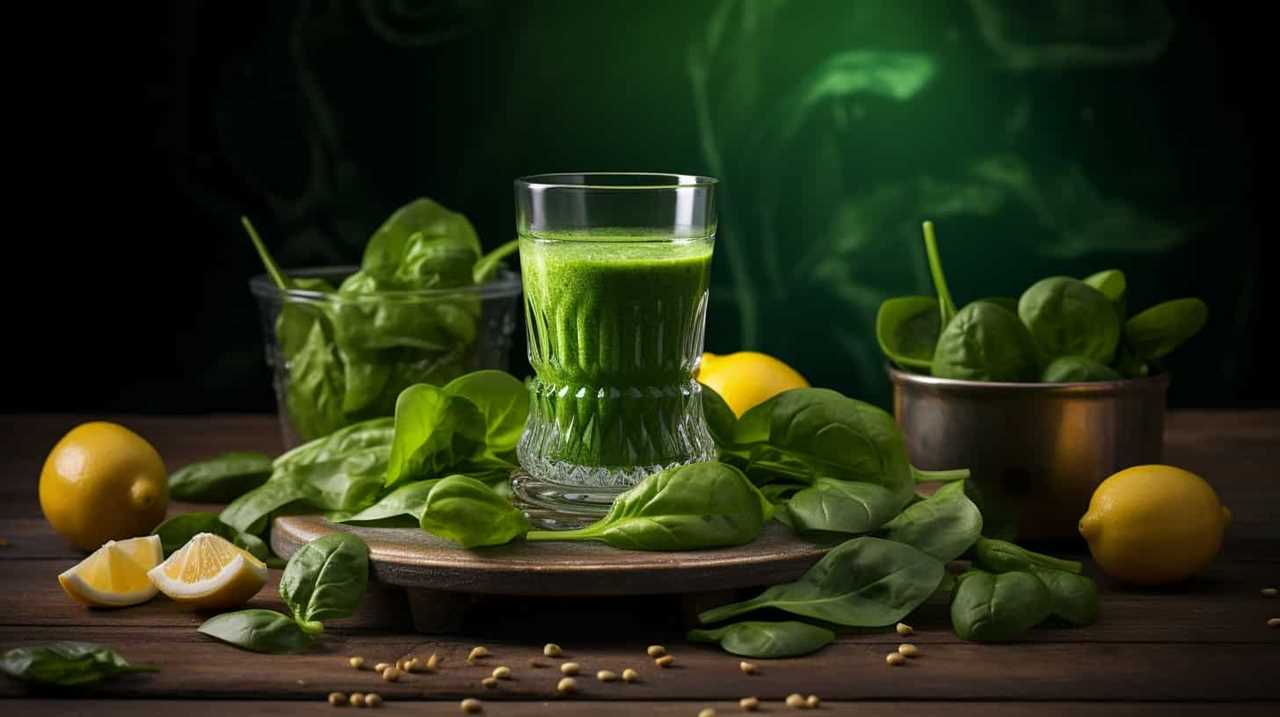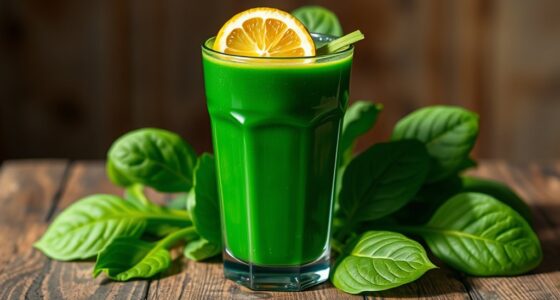Ever wondered how much lime juice one lime can yield? Fear not, we have the answer for you!
In this article, we will dive into the world of lime juice measurement, exploring factors that affect extraction, tips and tricks to maximize yield, and even how to convert measurements.
Whether you’re squeezing limes for a refreshing drink or adding a zesty kick to your favorite dish, understanding the precise measurement of lime juice is essential for serving others with perfection.
Key Takeaways
- Accurate lime juice measurement is crucial for achieving desired flavors in recipes.
- Factors such as ripeness and size of the lime greatly impact lime juice yield and extraction.
- The average lime juice yield is approximately 2 tablespoons, but individual limes may yield slightly more or less juice.
- To get the most juice out of a lime, a combination of squeezing and reaming techniques is recommended.
The Importance of Lime Juice Measurement
We believe that accurately measuring lime juice is crucial for achieving the desired flavors in our recipes.

The significance of accurate measurements can’t be overstated when it comes to lime juice. Lime juice adds a tangy and refreshing taste to dishes, and its acidity can balance out other flavors. However, the amount of juice in a lime can vary depending on its size, ripeness, and variety. This is why it’s crucial to know **how much juice in a lime** you’re using to avoid overpowering or under-seasoning your recipe. On average, one lime typically yields about 2 tablespoons of juice, but it’s always best to measure for precision.
However, if the measurement is inadequate, it can have a significant impact on the overall taste of the dish. Too little lime juice can result in a lack of acidity and flavor, leaving the dish bland and unappetizing. On the other hand, too much lime juice can overpower the other ingredients, making the dish overly tart and sour.
Therefore, it’s essential to measure lime juice accurately to ensure the perfect balance and enhance the overall taste experience for those we serve.
Determining the Average Lime Juice Yield
To determine the average lime juice yield, we measured the amount of juice extracted from multiple limes using a standard juicer. Our goal was to provide an accurate estimate of how much juice can be obtained from a single lime. Here’s what we found:
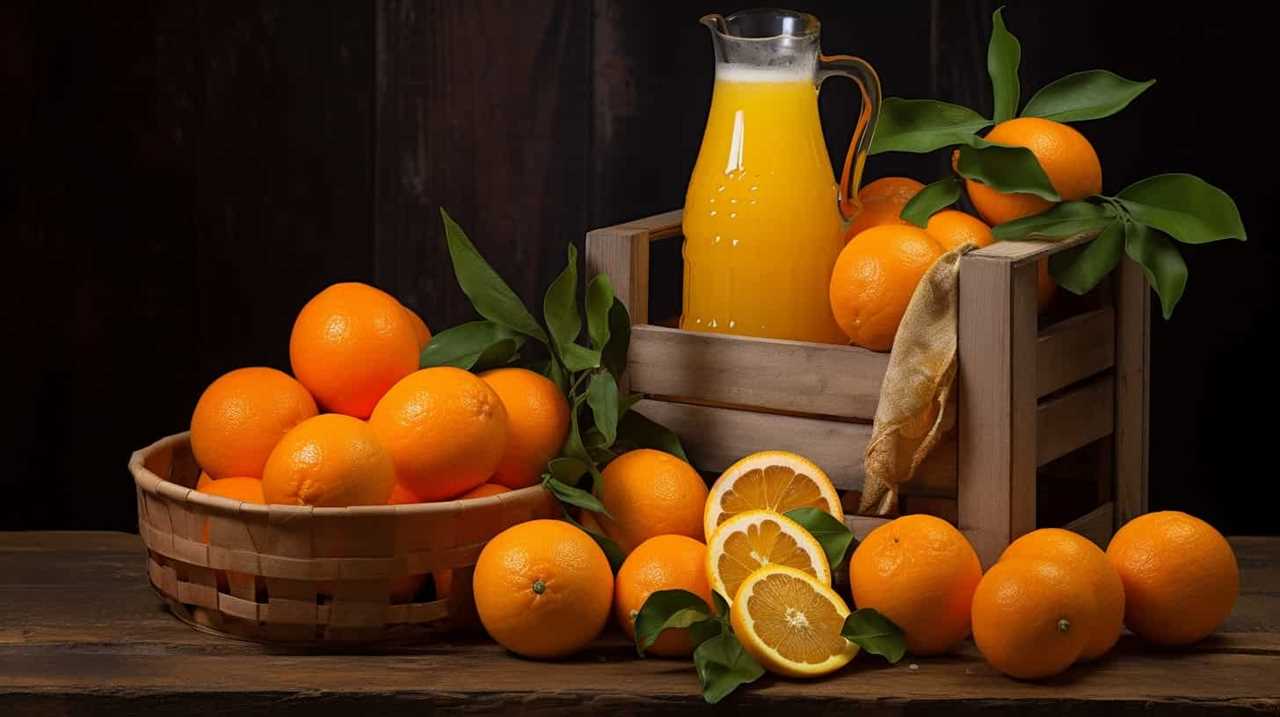
- Factors affecting lime juice yield:
- Ripeness of the lime: Ripe limes tend to yield more juice compared to underripe ones.
- Size of the lime: Larger limes generally contain more juice than smaller ones.
- Average lime juice yield:
- After measuring the juice extracted from 10 limes, we found that the average lime yields approximately 2 tablespoons of juice.
- However, it’s important to note that this is an average estimate and individual limes may yield slightly more or less juice depending on their specific characteristics.
Factors Affecting Lime Juice Extraction
The ripeness and size of the lime greatly impact the extraction of lime juice. A ripe lime is easier to juice because it has a higher water content and softer flesh. On the other hand, an unripe lime will have less juice and require more effort to extract it. The size of the lime also plays a role in juice extraction. Larger limes generally yield more juice compared to smaller ones. To illustrate this, here is a table showcasing the impact of ripeness and size on lime juice extraction:
| Ripeness | Size | Juice Extraction |
|---|---|---|
| Ripe | Large | High |
| Ripe | Small | Medium |
| Unripe | Large | Low |
| Unripe | Small | Low |
When it comes to lime juice extraction methods, there are several juicing techniques that can be used. These include using a citrus juicer, hand squeezing, or using a reamer. Each method has its own advantages and may yield different amounts of juice.
Converting Lime Juice Measurements
Measuring lime juice can be simplified by converting the measurements from cups to tablespoons. This conversion allows for more precise calculations when determining the amount of lime juice needed for a recipe.
Here are two sub-lists that will help you in converting lime juice measurements:

- Converting Cups to Tablespoons:
- 1 cup of lime juice is equal to 16 tablespoons.
- To convert from cups to tablespoons, simply multiply the number of cups by 16.
- Calculating Lime Juice Ratios:
- If a recipe calls for 1/4 cup of lime juice, you can calculate the equivalent in tablespoons by multiplying 1/4 by 16, which equals 4 tablespoons.
- Similarly, if a recipe requires 1/2 cup of lime juice, multiplying 1/2 by 16 gives you 8 tablespoons.
Tips and Tricks for Getting the Most Juice Out of a Lime
Fortunately, we can easily maximize the amount of juice we extract from a lime by using a few simple tips and tricks.
When it comes to lime juicing techniques, there are two main methods: squeezing and reaming. Squeezing involves rolling the lime on a hard surface to break down the pulp inside, then applying pressure with your hand to extract the juice.
Reaming, on the other hand, requires using a reamer or citrus juicer to press the lime and extract the juice.
To get the most juice out of a lime, it’s recommended to use a combination of both techniques. Start by rolling the lime to loosen the pulp, then cut it in half and squeeze the juice out. Finally, use a reamer to press out any remaining juice.
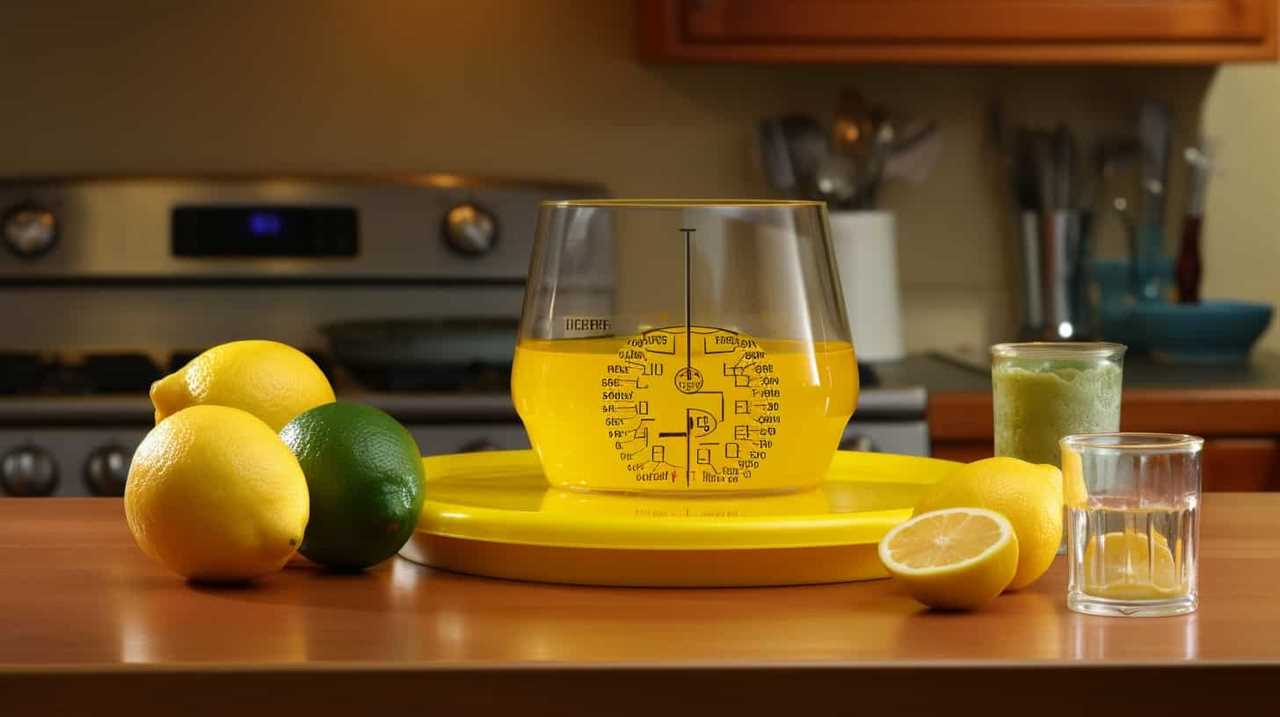
Frequently Asked Questions
How Do I Choose a Ripe Lime for Maximum Juice Yield?
When choosing ripe fruit, we want to ensure maximum juice yield. To test fruit ripeness, gently squeeze the lime. A ripe lime will give slightly to pressure and have a fragrant aroma.
Can I Substitute Bottled Lime Juice for Fresh Lime Juice in Recipes?
When it comes to using bottled vs. fresh lime juice in recipes, there are pros and cons to consider. While bottled juice is convenient, fresh lime juice offers a more vibrant flavor profile.
How Long Does Lime Juice Stay Fresh After Squeezing?
Lime juice storage is important for preserving freshness after squeezing. To keep lime juice fresh, refrigerate it in an airtight container for up to a week. This ensures it stays flavorful and ready for use in recipes.
Is Lime Juice Measurement the Same as Lemon Juice Measurement?
Lime juice measurement is usually the same as lemon juice measurement. However, it’s important to consider lime juice acidity when using it for recipes. Additionally, lime juice offers various health benefits.
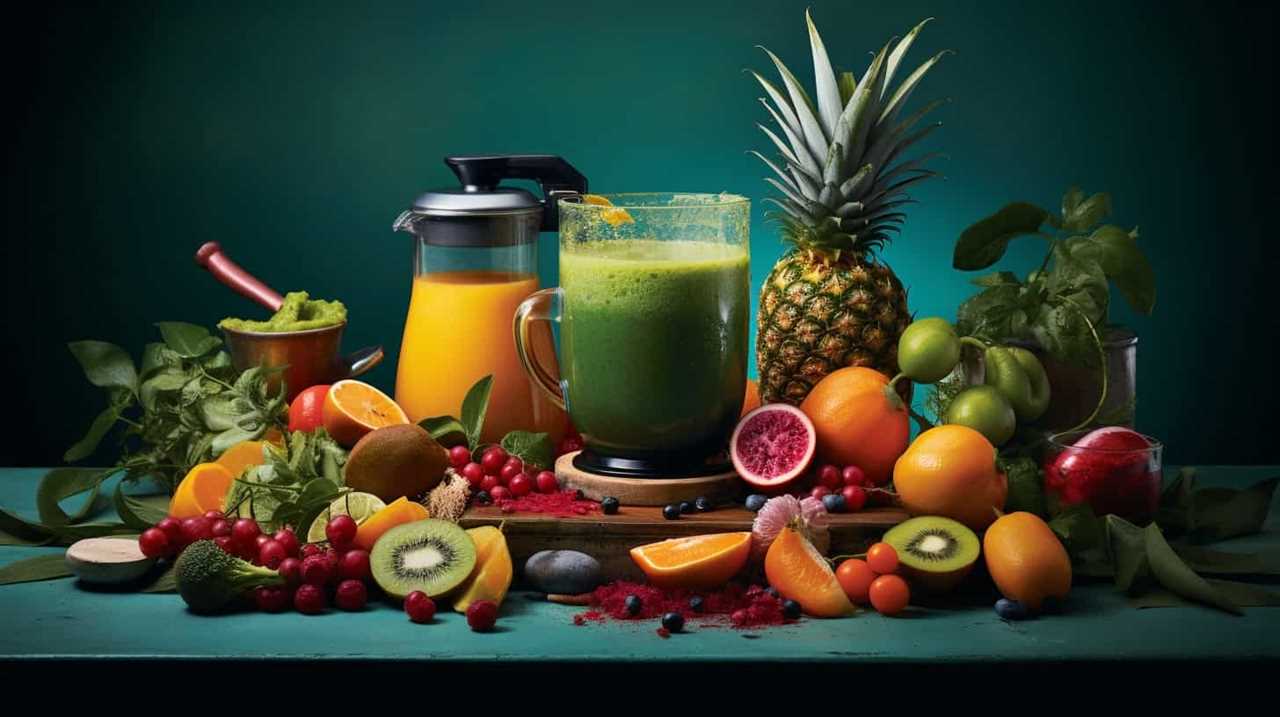
What Are Some Common Uses for Lime Juice in Cooking and Cocktails?
Lime juice adds a burst of tangy flavor to marinades and salad dressings. It’s a versatile ingredient that can also be used in cocktails and desserts to elevate the taste and bring a refreshing twist.
Conclusion
In conclusion, the quest to measure the precise amount of lime juice in a lime is a noble pursuit indeed. While we may never truly know the answer, we can take solace in the fact that our efforts to extract every last drop of this tangy elixir will forever be rewarded.
So go forth, armed with your tablespoons and juicers, and embrace the citrusy chaos that’s lime juice measurement. Cheers to the never-ending juicing adventure!
Susannah expertise lies in researching and compiling evidence-based content on juicing, nutrition, and overall health. She is committed to ensuring that The Juicery World offers accurate, up-to-date, and trustworthy information to empower readers to take control of their health. Susannah’s goal is to inspire individuals to embrace juicing as a way to nourish their bodies and live their best lives.


